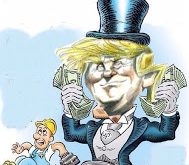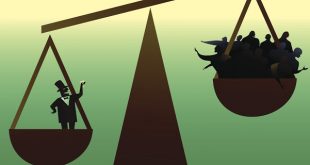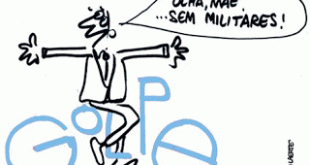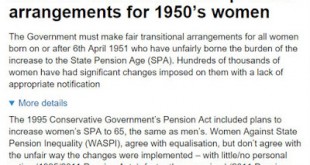Eileen Appelbaum Eileen Appelbaum delivered the David Gordon Memorial Lecture at the Chicago Meetings of the Union of Radical Political Economics (URPE). The lecture, and the comments by John Schmitt will be published later in the Review of Radical Political Economics (RRPE). The gist of the argument is that ever stronger corporations use their dominant position in markets, patent and copyright protections, and their political influence to obtain favorable regulations and tax breaks to...
Read More »Can Trumponomics work?
Work for whom? That's what Martin Sandbu (subscription required) asks in the Financial Times. In his view, it might. He cites Ken Rogoff -- of spreadsheet fame -- who also has said that it's a possibility. Sandbu cites Summers doubts on Trumponomics, which are all based on supply side factors, but has very little to say about that.* Like Rogoff, Sandbu thinks that what matters is private investment that matters, meaning demand, and, as it must be in these cases, the confidence fairy...
Read More »Are inheritance taxes unfair?
Are inheritance taxes unfair? Many people think they are. "Why should I be taxed twice on money I've earned during my lifetime?" they say. This is, of course, a fallacy. Dead people don't pay taxes. Living ones do. So inheritance tax is not double taxation of money the dead person earned while they were still alive. It is taxation of an unearned windfall for the people to whom they leave their assets, usually their children. Other forms of unearned income, such as interest on...
Read More »Tom Palley on Inequality and Growth
New paper published by PERI. From the abstract: This paper examines the relationship between inequality and growth in the neo-Kaleckian and Cambridge growth models. The paper explores the channels whereby functional and personal income distribution impact growth. The growth – inequality relationship can be negative or positive, depending on the economy’s characteristics. Contrary to widespread claims, inequality per se does not impact growth through macroeconomic channels. Instead, both...
Read More »Some thoughts on the impeachment and the right wing turn in Brazil
Riding the coup bike without the military Brazilian President Dilma Rousseff has been impeached. The vice-president, Michel Temer, will assume the presidency temporarily while she is judged by the Senate. While the final outcome is still uncertain, it is very unlikely that she will return to office. This closes the long cycle of the left in Brazil, which started with the election of Luiz Inácio Lula da Silva to the presidency in 2002, and that led to the election and re-election of the...
Read More »Tom Palley on Inequality, the financial crisis and stagnation
From the abstract: This paper examines several mainstream explanations of the financial crisis and stagnation and the role they attribute to income inequality. Those explanations are contrasted with a structural Keynesian explanation. The role of income inequality differs substantially, giving rise to different policy recommendations. That highlights the critical importance of economic theory. Theory shapes the way we understand the world, thereby shaping how we respond to it. The...
Read More »Real Fiscal Responsibility, Vol. II: The Peterson Network, Inequality, and the Failure of Neoliberalism
This is how the mission of the President’s National Commission on Fiscal Responsibility and Reform was defined by the White House on February 18, 2010: The Commission is charged with identifying policies to improve the fiscal situation in the medium term and to achieve fiscal sustainability over the long run. Specifically, the Commission shall propose recommendations designed to balance the budget, excluding interest payments on the debt, by 2015. This result is projected to stabilize the...
Read More »What they really want
As Henry Tapper puts it, today is WASPI day. Today is the day that "Women Against State Pension Inequality" get the Westminster debate for which they have campaigned.Eh, wait? Wasn't there a debate on this back in early January?Yes, there was. It was a backbench motion proposed by the SNP MP Mhairi Black. It called on the government to re-examine the acceleration of the equalisation of women's and men's pension ages in the 2011 Pensions Act, which added up to 18 months to the state pension...
Read More »Robert Skidelsky on the State of Economics, Banks, and Inequality
Robert Skidelsky, author of Keynes: The Return of the Master (London, rev. edn. 2010), speaks below in an interview on the state of neoclassical economics, banks, and inequality. Unfortunately, I don’t think Skidelsky sees the how rotten the current EU is and the merits of a possible Brexit, but apart from this there is much of interest here.[embedded content]
Read More »The Global Haves And Have-Nots In The 21st Century
NEP’s Marshall Auerback interviews Branko Milanovic, Visiting Presidential Professor, The Graduate Center, City University of New York. This is almost certainly the highest level of relative, and certainly absolute, global inequality at any point in human history. Is there anything we can do to reverse or mitigate this trend? See the interview here. [Translate]
Read More » Heterodox
Heterodox






